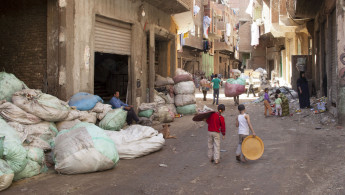Cairo's deadly environment
Ahmed Yasser never expected that breathing in smoke from the burning of rice straw in the farms near his house in south Cairo would lead to the serious respiratory problems he suffers from.
Ahmed was forced to sell his house at a loss in fear that his young children would suffer a similar fate.
“I never used to pay any attention to the straw being burnt. It was only when my health deteriorated that I discovered how dangerous the polluted air I'd been living with was,” said Ahmed as he pocketed his prescription from the doctor.
According to a report by the Egyptian Scientific Society for Bronchology published earlier this year, pollution in Egypt comes at an annual human cost of 2,400 early deaths, 1,500 cases of acute bronchitis, 329,000 cases of respiratory infection and 8 million asthma attacks.
“Air pollution and its harmful affects are worse in Cairo,” says Dr. Tareq Safwat, the president of the society. He told al-Araby al-Jadeed: “The factories in Hilwan, Shubra al-Khayma, Imbaba and Warraq encircle Cairo with pollution, causing chronic obstructive pulmonary disease, which results in breathing difficulties.”
| Egypt comes sixth on WHO's 2014 list of most polluted countries. Cairo residents breath in air 20 times more polluted than the acceptable daily level. |
Safwat believes that the authorities are not doing enough either to curb the main air pollutants around Cairo or to combat people's lack of awareness of the issue.
Farmers in the areas surrounding Cairo burn rice straw after their annual harvest to clear the fields and this releases carbon monoxide into the atmosphere, both increasing temperatures in the capital and causing serious respiratory problems.
While factories in the Cairo area are responsible for approximately half of the capital’s pollution, according to a report in December 2014 by the National Centre for Research (NCR), the burning of rubbish is responsible for another 15%.
The sixth most polluted country
Egypt comes sixth on the World Health Organisation’s (WHO) list of most polluted countries for 2014. WHO described Cairo residents as breathing in air that is 20 times more polluted than the acceptable daily level.
Aliya Ahmed, a researcher from the NCR’s Air Pollution department said: “This ranking is natural given that the government places no limits on factories and investors to control the harmful emissions being released into the atmosphere. These emissions pose health risks to citizens, such as lung cancer.”
Statistics by the Ministry of Environment show that there were 934 recorded violations of pollution regulations in Cairo in 2014, compared to 813 in 2013 and 750 in 2012, suggesting that pollution is on the increase in the capital. Aliya Ahmed believes this is a very dangerous trend and blames the environmental standards set by the government, which are far lower than those of other countries.
Economic impact
Yusri Abdullah is a researcher at the Adalah Centre for Economic Studies. He estimates that air pollution in Cairo comes at an annual cost to the government of approximately $1.3bn, in addition to medical and other the costs footed by individuals.
“Cairo contains 51% of Egypt’s polluting industrial infrastructure. The problems of pollution and the costs of countering them are likely to be exacerbated by the increasing population and the growing rate of industrial development in the capital,” he said.
In an attempt to mitigate Cairo’s pollution problems, the Ministry of Environment has inaugurated a project to run public transport on natural gas, according to the Minister, Khaled Fahmi.
The project is part of a host of measures designed to to improve the capital’s air quality. These include measures to enhance Egyptian fuel quality, take old public transport vehicles off the roads and plant a million trees.



